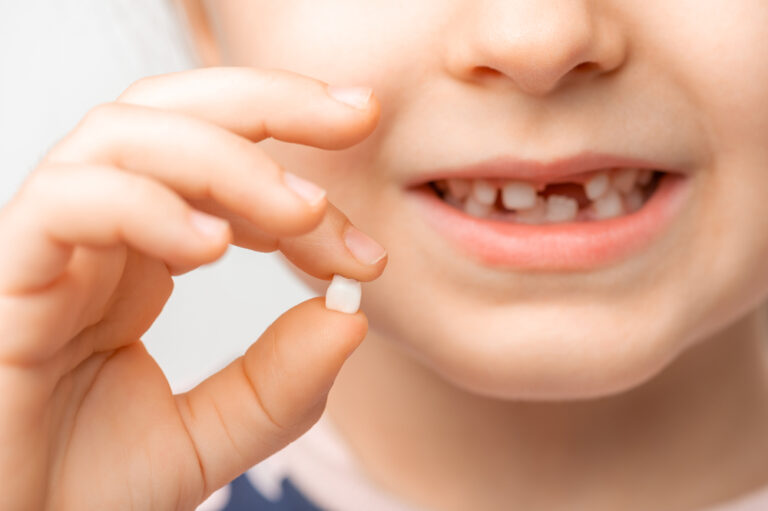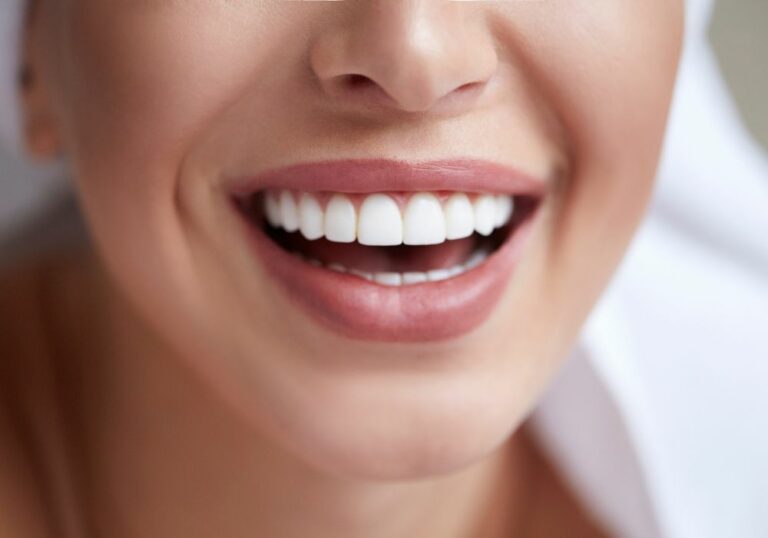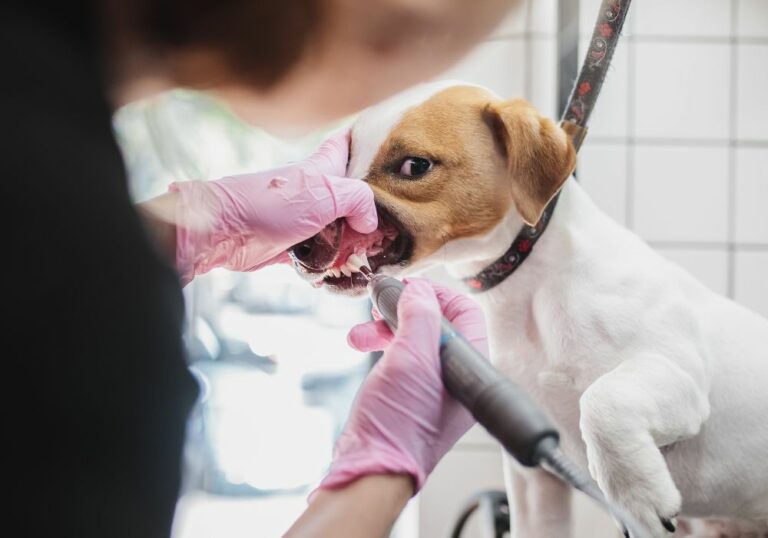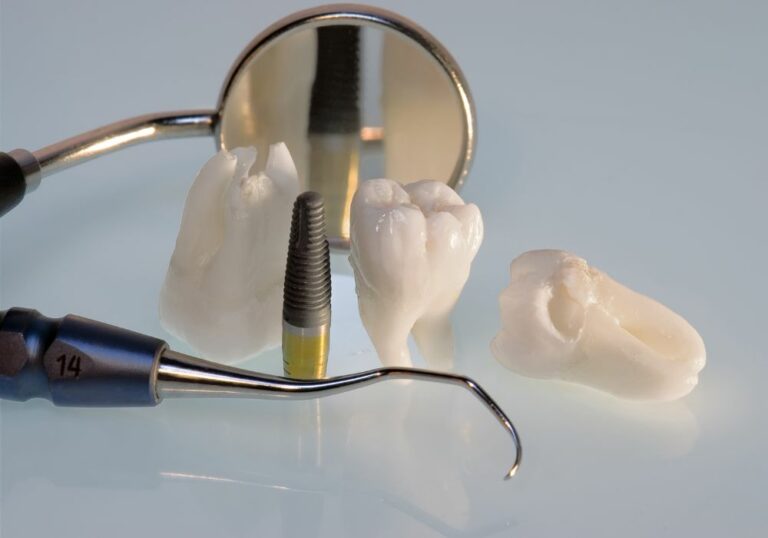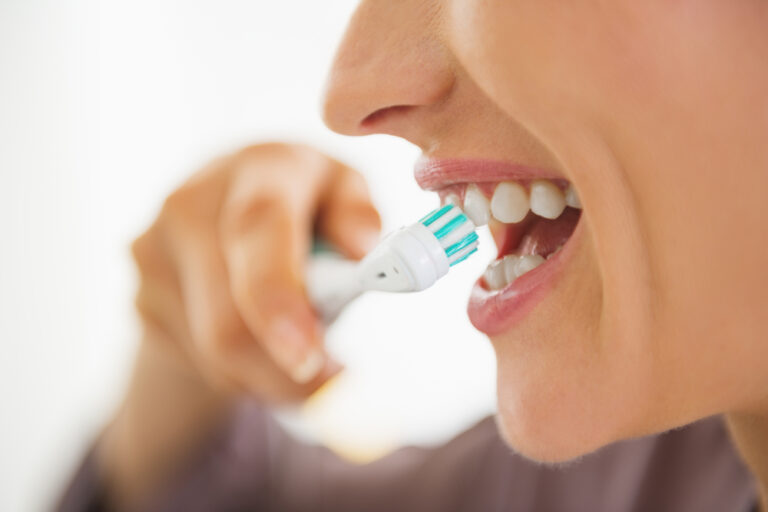Eggshells are the hard outer covering that protects the fragile egg inside. Most people simply throw eggshells in the trash after cracking open eggs. However, some have wondered whether eggshells can be repurposed to make toothpaste.
In this comprehensive article, we’ll explore the science and research behind using eggshell powder as an ingredient in DIY toothpaste recipes. We’ll cover:
- eggshell composition and nutritional benefits
- studies analyzing the effects of eggshell toothpaste
- step-by-step instructions for making eggshell toothpaste at home
- pros and cons of switching to eggshell toothpaste
- expert opinions on using eggshell toothpaste
- additional ways to use eggshells around the home
By the end, you’ll have all the information you need to decide if eggshell toothpaste could be a good addition to your oral care routine.
Eggshell Composition and Nutritional Value
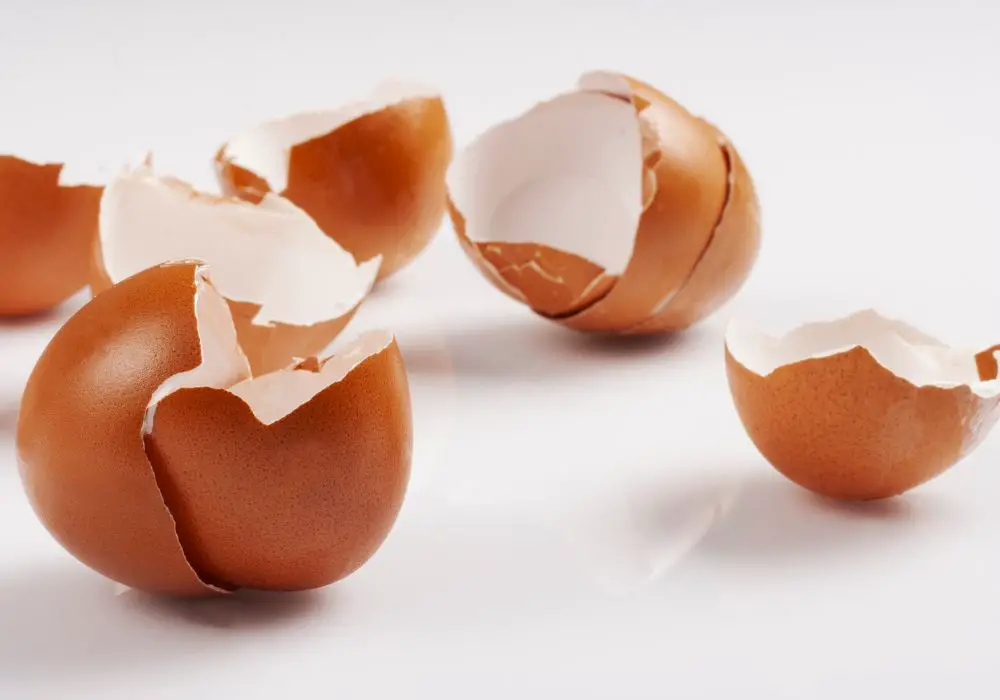
Chicken eggshells are made of calcium carbonate – the same mineral that makes up chalk, limestone, and marble.
Calcium carbonate makes up about 94% of an eggshell’s total weight. Eggshells also contain small amounts of protein, magnesium, phosphorus, potassium, sodium, zinc, manganese, iron and copper.
However, the key nutrient eggshells provide is calcium. Just how much calcium do they contain?
100 grams of eggshells provides around 33 grams of calcium, making eggshells one of the richest natural sources of calcium.
To put that into perspective, the recommended daily calcium intake for most adults is around 1000-1200 mg. So just one teaspoon of eggshell powder weighing in at 3 grams provides:
33% x 3 grams = 99 mg calcium
That’s already 8-10% of your recommended daily calcium intake from a single teaspoon of eggshells!
But why does the calcium content matter for toothpaste? Here are some of the ways calcium may benefit dental health:
- Calcium strengthens and remineralizes tooth enamel to help prevent cavities
- It binds to plaque and bacteria to hinder tartar formation
- The abrasive texture of eggshell powder can scrub stains off teeth
- Calcium may promote gum health by stimulating saliva production
With such impressive calcium content, eggshell powder holds potential for improving oral health. But what does the research say?
Research Examining the Effects of Eggshell Toothpaste
Several small clinical studies have analyzed the effects of eggshell toothpaste on plaque, cavities, gum health and enamel strength. Here is an overview of their findings:
Strengthening Tooth Enamel
A 2019 study published in the International Journal of Dentistry had participants brush with either 5% eggshell powder toothpaste or standard fluoride toothpaste twice daily for four weeks. They tested enamel samples before and after the experiment.
The results showed brushing with eggshell powder toothpaste increased enamel hardness by more than 150%. Meanwhile, the fluoride toothpaste group had no significant change.
Researchers concluded that eggshell powder enhances remineralization and strengthening of tooth enamel.
Reducing Plaque Buildup
A double-blind study in 2015 from the Saudi Journal of Dental Research divided participants into two groups using either:
- Eggshell powder toothpaste
- Standard fluoride toothpaste
After 6 weeks, the eggshell powder group showed significant plaque reduction, lowering plaque by up to 29%. The fluoride toothpaste showed minimal change in plaque levels.
Researchers suggested eggshell powder has a unique abrasive texture that effectively scrubs away plaque.
Lowering Cavity Risk
A 3-month clinical trial in India examined the effects of eggshell toothpaste on cavity formation in a group of over 100 schoolchildren.
The children were divided into two groups using either:
- Eggshell toothpaste
- Conventional fluoride toothpaste
Results showed children using the eggshell toothpaste had 60% fewer new cavities develop compared to the fluoride toothpaste group.
Researchers credited the high calcium content of eggshells for increasing enamel strength and lowering cavity susceptibility.
Based on these studies, eggshell toothpaste may be superior to regular fluoride toothpaste when it comes to strengthening enamel, removing plaque, and preventing dental cavities.
However, the studies had small sample sizes and limited time durations. More extensive, long-term research is still required to confirm eggshell toothpaste’s effects.
Now that we’ve looked at the science, let’s turn to how you can make DIY eggshell toothpaste at home.
How to Make Eggshell Toothpaste
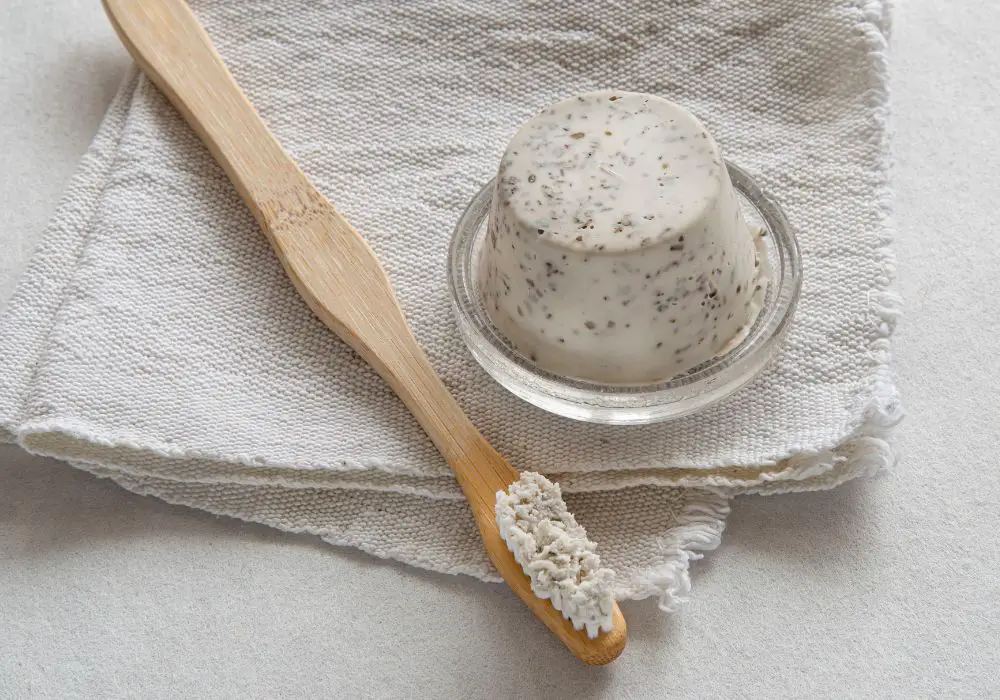
Creating your own eggshell toothpaste only requires a few simple ingredients:
Ingredients:
- 3 tablespoons finely powdered eggshells
- 3 tablespoons baking soda
- 2 tablespoons coconut oil
- 5 drops peppermint essential oil (or your preferred flavor)
Instructions:
- Thoroughly clean and dry leftover eggshells from cracking eggs. Let the shells fully air dry for at least 24 hours.
- Grind the shells into a fine powder using a mortar and pestle, coffee grinder, blender, or food processor. Make sure there are no large gritty pieces left.
- Sift the powder through a fine mesh strainer or cheesecloth to filter out remaining shell fragments. You want an ultra-smooth powder.
- Combine all ingredients in a small mixing bowl. Stir vigorously until a thick, creamy paste forms.
- Scoop the paste into a small airtight container for storage. Glass jars or stainless steel containers work best.
- To use, wet your toothbrush and scoop out about 1/2 teaspoon of paste per brushing. Brush gently to avoid damaging enamel.
And that’s it! With just a few eggshells and basic pantry items, you can make enough toothpaste to last 2-3 months.
Now let’s go over the potential pros and cons of switching to eggshell toothpaste.
Pros and Cons of Using Eggshell Toothpaste
Potential Benefits:
- May strengthen and remineralize tooth enamel
- Natural source of calcium and minerals
- Abrasive texture can help scrub away stains
- Appears to reduce plaque and cavity formation
- Lower cost than commercial toothpaste
- Avoidant of chemical detergents in regular toothpaste
- Has neutral, non-minty taste
Potential Drawbacks:
- Not as well proven as fluoride toothpaste for cavity prevention
- DIY recipes aren’t tested for safety or efficacy
- Eggshell pieces could damage enamel if not finely ground
- Gritty, chalky texture takes getting used to
- Can be abrasive on gums, especially with bigger particles
- No standard dosage or formula
- Short shelf life of 1-2 months
As you can see, eggshell toothpaste has several promising benefits but also comes with some cautions. Proper preparation and usage is key to minimizing any risks.
Overall, eggshell toothpaste may be an effective supplemental paste when alternated with regular fluoride toothpaste. But more research is still needed before fully replacing your current toothpaste.
Expert Opinions on Eggshell Toothpaste
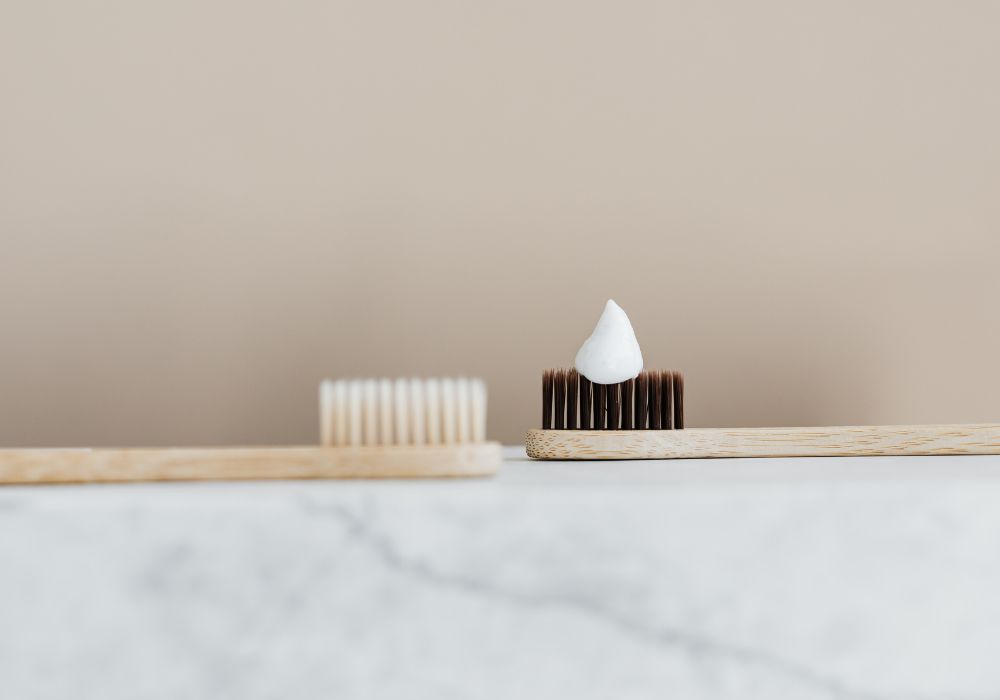
With eggshell toothpaste growing in popularity, what are dentists and dental organizations saying about it?
Most mainstream dental groups like the American Dental Association (ADA) and British Dental Association have not taken an official stance on eggshell toothpaste.
But according to dental health experts, here are some guidelines on eggshell toothpaste use:
- While it shows promise, eggshell powder cannot be considered an equal substitute for fluoride toothpaste in fighting cavities. Fluoride remains the number one recommended ingredient for preventing cavities.
- Eggshell toothpaste may provide additional benefits when used occasionally in rotation with regular fluoride paste. But more research is needed before making it a daily toothpaste.
- Proper cleaning, grinding, and sifting of the eggshell powder to an ultra-fine texture is vital to prevent enamel scratches or gum damage.
- Children under 12 should not use eggshell powder, as their developing enamel is more susceptible to abrasion damage.
- Consult your dentist before trying eggshell toothpaste, especially if you have issues like tooth sensitivity, gingivitis or acid erosion.
- Apply gentle pressure when brushing with eggshell paste and minimize brushing time to under 2 minutes. Let saliva help neutralize and swallow the paste.
- Be aware that DIY pastes like eggshell toothpaste have no oversight, quality testing, or verification of their claims like commercial toothpastes.
The consensus among dental professionals seems to be cautious optimism about eggshell toothpaste. But more clinical studies on its long-term efficacy and safety are needed.
Other Uses for Eggshells Around the Home
Aside from toothpaste, eggshells have a surprising number of uses. Here are some creative ways to put eggshells to work:
- Facial exfoliator – Powdered eggshells can be mixed into DIY face scrubs as a gentle abrasive to remove dead skin cells and improve circulation.
- Dietary calcium supplement – Add a teaspoon of powdered eggshells into smoothies, juices or yogurt for an extra calcium boost.
- Garden fertilizer – Eggshells contain calcium, phosphorous and other minerals that nourish plants and neutralize soil pH.
- Coffee extender – Eggshell powder can be brewed with coffee grounds to gently cut coffee’s acidity.
- Pest deterrent – Spreading crushed eggshells around garden beds helps deter slugs and snails from attacking plants.
- Bird feeder – Both dried eggshells and hardboiled eggs can be fed to backyard birds as a nutritious calcium supplement.
- Arts and crafts – Eggshells can be used to make holiday ornaments, decorative bowls, mosaic tiles, and more.
Don’t let old eggshells go to waste! With a little creativity, their health benefits can extend far beyond just toothpaste.
Conclusion
While eggshell toothpaste shows initial promise from preliminary studies, the dental community recommends proceeding with caution until more extensive research is done. There is still no long-term data on its safety and effectiveness.
For now, eggshell powder may be best used occassionally as a rotational supplement to regular fluoride toothpaste. It should not fully replace fluoride paste as your daily toothpaste without first consulting your dentist.
With proper preparation and careful use, eggshell toothpaste could provide some oral health benefits thanks to its exceptional calcium content. But be sure to speak with your dentist before changing your dental care routine.
The next time you crack open an egg, don’t toss that shell away! Eggshells can not only potentially strengthen your smile, but find use all around your home and garden.


